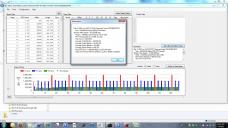
PTool 3.60D: Encoder Setting 1 controls B-Frames
-
I have isolated Encoder Setting 1 for 720p and I can unequivocally say that it determines whether the codec uses B frames or not. If you change nothing else and use Encoder Setting 1 = 3 it will use B-Frames. If you use 2 it will not use B-Frames. It also increases the bit rate up to 22 mb/sec to almost 24 mb/sec. Using B-Frames with 720p improves it tremendously. However, stability is an issue. If you record a 1080p @ 24 FPS video first and then record 720p @ 60 FPS stability returns.
I have attached the testing I have done so far and the best stream parser results I have seen. VLC indicates that this is still true 720p @ 60 FPS with B-Frames.
Feel free to use this information as you see fit. I don't need credit. It is not like I am planning on getting a patent on the settings or anything. -
Here are some Stream Parser images that show 1080i and 1080p @ 24 FPS without B frames. Not neccessarily something you would want to do. However, the only setting changed for these two resolutions was the single encoder 1 setting. It went from 3 to 2.
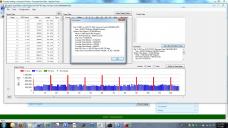
 1080i Without B frames.jpg1600 x 900 - 356K
1080i Without B frames.jpg1600 x 900 - 356K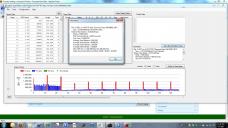
 1080p without B frames.jpg1600 x 900 - 347K
1080p without B frames.jpg1600 x 900 - 347K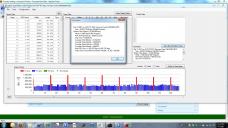
 1080i Without B frames.jpg1600 x 900 - 356K
1080i Without B frames.jpg1600 x 900 - 356K -
Excellent @mpgxsvcd
I'd like to see some tests with B frames on / off in the same mode, with different bitrates. Turning b-frames off might free up CPU time for higher bitrates, although it might be better to compromise bitrate and keep b-frames turned on. We need to find out which of these approaches produces the best image... -
@mpgxsvcd
Next time use proper category and tags, please. -
Over good idea is to use Overall bitrate patch and not forget Video buffer.
-
@mpgxsvcd - cool, thanks (and of course most of all to you, Vitaliy)! Suppose green is the setting with the best results so far? I'll adapt the gop lenght to PAL and try it out in a couple of hours.
-
From the extensive testing I did last night. The overall bit rate settings have no benefit on the video. Those settings actually have a negative impact. They cause the codec to ramp up really high at first and then over compensate and produce a pumping affect in the video. You can see it in the attached stream parser file.
You are much better off to adjust the Codec Setting 1 to enable B frames and leave everything else unchanged. That will automatically increase the overall bit rate to 24 mb/sec or more depending on whether you have decreased your GOP or not. Decreasing the GOP decreasing stability drastically though.
The 720p setting is not anywhere near stable yet. It will fail everytime if your first action is to record 720p video. If you record 1080p @ 24 FPS first it will be very stable with a GOP of 30 though. A GOP of 15 is fairly stable as well if you record the 1080p first.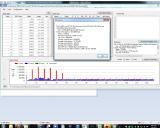
 720p Pumping.jpg1280 x 1024 - 324K
720p Pumping.jpg1280 x 1024 - 324K -
I am having trouble playing the 720p files with B-frames in VLC. It freezes after a second or two. However, the files play just fine in Windows Media Player. I think the GH13 had a similar problem that I had fixed by installing something. Does anyone know how to fix this issue with VLC?
-
Here is some nice GOP = 30 720p. It shows a lot less "Mud" than the 1080p @ 24 FPS video does of the same scene. The 720p file was @ 28 mb/sec. The 1080p @ 24 FPS file was at 22 mb/sec.
I recorded the same wide angle scene with all of the resolutions. The 1080i was absolute garbage compared to the 1080p and 720p versions. It had the lowest bit rate though. Even with b-frames the 1080i still wasn't any good because its average bit rate was so low.
I will try to post all of the sample files to Vimeo later today.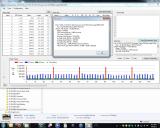
 Great 720p.jpg1280 x 1024 - 356K
Great 720p.jpg1280 x 1024 - 356K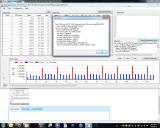
 Bad 1080i.jpg1280 x 1024 - 332K
Bad 1080i.jpg1280 x 1024 - 332K -
IF your having problems with VLC
Splash lite is a free AVCHD player
I find it works better than VLC
http://mirillis.com/en/products/splash.html -
ok a couple of questions.
so changing only encoder 1 to enable 720p/60 B frames REQUIRES a 24p file recorded first to be stable, correct?
As I mentioned in the other thread, this seems like some kind of set-up sub routine is run when you record a 24p file and then when you run the 720p, the settings are carried over. I don't think this is something that is strictly in the encoder settings tables..
Do you think the VLC problem is a player codec problem or could it be some problem with the camera codec non-conforming now that it's been modified? -
@svart
Try to use other settings.
I suggest to try to adjust Video Buffer to make it equal to Video Buffer 24p value.
This topic is closed.
← All Discussions Start New Topic


Howdy, Stranger!
It looks like you're new here. If you want to get involved, click one of these buttons!
Categories
- Topics List23,990
- Blog5,725
- General and News1,353
- Hacks and Patches1,153
- ↳ Top Settings33
- ↳ Beginners256
- ↳ Archives402
- ↳ Hacks News and Development56
- Cameras2,366
- ↳ Panasonic995
- ↳ Canon118
- ↳ Sony156
- ↳ Nikon96
- ↳ Pentax and Samsung70
- ↳ Olympus and Fujifilm100
- ↳ Compacts and Camcorders300
- ↳ Smartphones for video97
- ↳ Pro Video Cameras191
- ↳ BlackMagic and other raw cameras116
- Skill1,960
- ↳ Business and distribution66
- ↳ Preparation, scripts and legal38
- ↳ Art149
- ↳ Import, Convert, Exporting291
- ↳ Editors191
- ↳ Effects and stunts115
- ↳ Color grading197
- ↳ Sound and Music280
- ↳ Lighting96
- ↳ Software and storage tips266
- Gear5,420
- ↳ Filters, Adapters, Matte boxes344
- ↳ Lenses1,582
- ↳ Follow focus and gears93
- ↳ Sound499
- ↳ Lighting gear314
- ↳ Camera movement230
- ↳ Gimbals and copters302
- ↳ Rigs and related stuff273
- ↳ Power solutions83
- ↳ Monitors and viewfinders340
- ↳ Tripods and fluid heads139
- ↳ Storage286
- ↳ Computers and studio gear560
- ↳ VR and 3D248
- Showcase1,859
- Marketplace2,834
- Offtopic1,320

